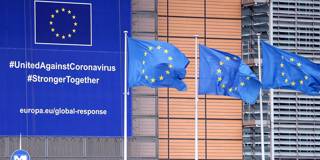The COVID-19 crisis has created an opening for stronger collective European action. But policymakers must understand that the demands of voters across the continent for greater cooperation do not reflect an appetite for institution-building, but rather a deeper anxiety about losing control in a perilous world.
BERLIN – When COVID-19 struck Europe and forced millions of people into internal exile, many were overcome by a deep sense of loneliness. This reflected not only a craving to be reunited with friends and family, but also a broader feeling that their countries had been helpless and abandoned in the face of the global pandemic. This sense of rejection is profoundly affecting the individual psyches and worldviews of Europe’s citizens.
That is the main finding of a recent European Council on Foreign Relations poll of 11,000 people across nine European countries – Bulgaria, Denmark, France, Germany, Italy, Poland, Portugal, Spain, and Sweden – that together represent two-thirds of the EU’s population. Paradoxically, the ECFR poll shows that the absence of European Union help for member states during the first phase of the crisis has led to an overwhelming demand for concerted EU action – both to help countries recover from the crisis and to equip them to survive in the world the pandemic is creating.
The ECFR’s survey reveals that Europeans have felt completely let down during the crisis by EU institutions, multilateral organizations, and Europe’s closest partners. Some 63% of respondents in Italy and 61% in France said that the EU did not rise to the challenge posed by the pandemic.

BERLIN – When COVID-19 struck Europe and forced millions of people into internal exile, many were overcome by a deep sense of loneliness. This reflected not only a craving to be reunited with friends and family, but also a broader feeling that their countries had been helpless and abandoned in the face of the global pandemic. This sense of rejection is profoundly affecting the individual psyches and worldviews of Europe’s citizens.
That is the main finding of a recent European Council on Foreign Relations poll of 11,000 people across nine European countries – Bulgaria, Denmark, France, Germany, Italy, Poland, Portugal, Spain, and Sweden – that together represent two-thirds of the EU’s population. Paradoxically, the ECFR poll shows that the absence of European Union help for member states during the first phase of the crisis has led to an overwhelming demand for concerted EU action – both to help countries recover from the crisis and to equip them to survive in the world the pandemic is creating.
The ECFR’s survey reveals that Europeans have felt completely let down during the crisis by EU institutions, multilateral organizations, and Europe’s closest partners. Some 63% of respondents in Italy and 61% in France said that the EU did not rise to the challenge posed by the pandemic.